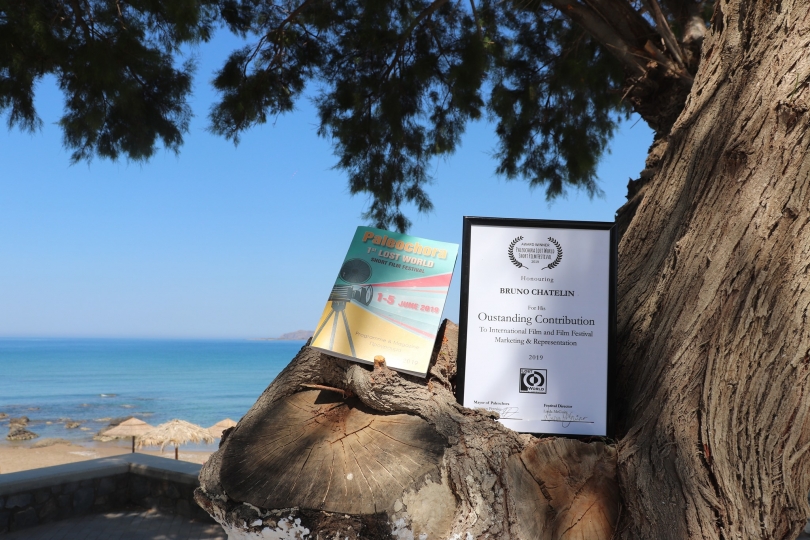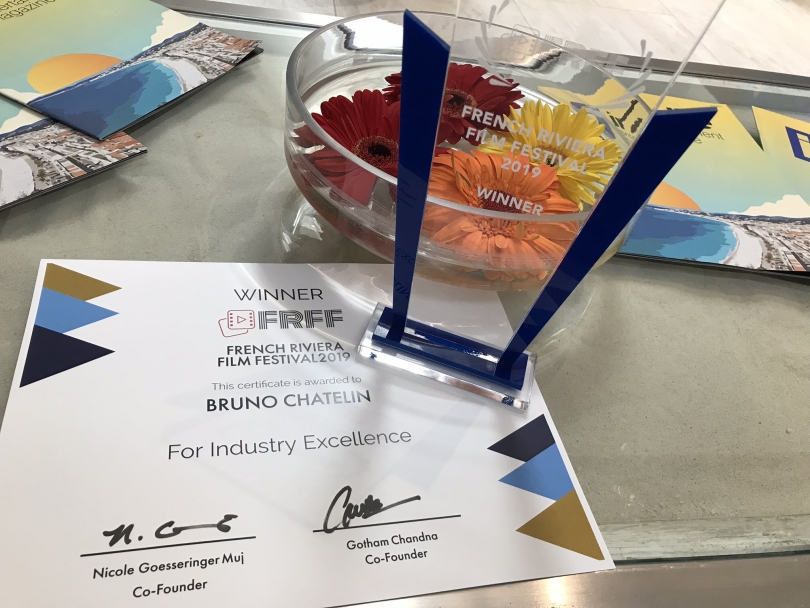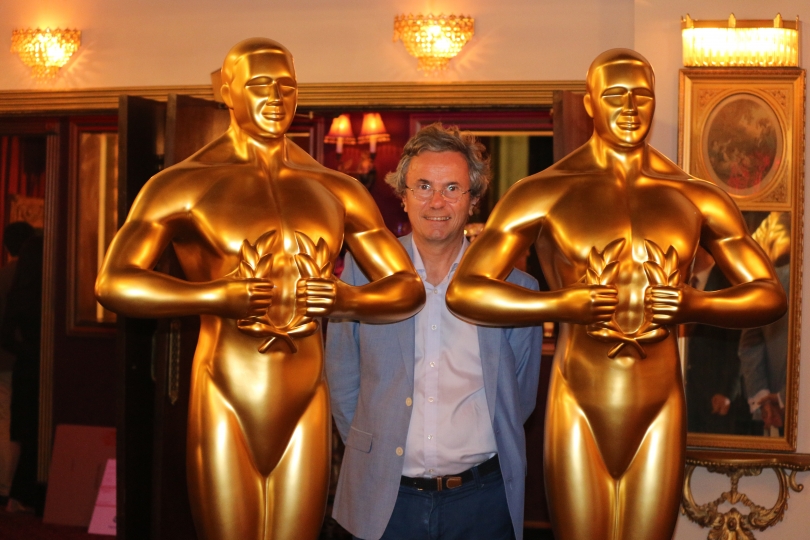|
|
||
|
Pro Tools
FILMFESTIVALS | 24/7 world wide coverageWelcome ! Enjoy the best of both worlds: Film & Festival News, exploring the best of the film festivals community. Launched in 1995, relentlessly connecting films to festivals, documenting and promoting festivals worldwide. Sorry for the interruption, we needed to correct and upgrade some modules. Working on a new website. For collaboration, editorial contributions, or publicity, please send us an email here. You need for put your full detail information if you want to be considered seriously. Thanks for understanding. User login |
Editor
THE NEWSLETTER REACHES 171 000 FILM PROFESSIONALS EACH WEEK (december 2023) .Share your news with us at press@filmfestivals.com to be featured. SUBSCRIBE to the e-newsletter.
MEET YOUR EDITOR Bruno Chatelin - Check some of his interviews. Board Member of many filmfestivals and regular partner of a few key film events such as Cannes Market, AFM, Venice Production Bridge, Tallinn Industry and Festival...Check our recent partners. The news in French I English This content and related intellectual property cannot be reproduced without prior consent.  Festival Introduction by the Director of the 65th Mostra, Marco Müller
Biennale Cinema 65th Venice Film Festival
We resolved, for this new-four years mandate of the Cinema Section of La Biennale (for this 65th Venice Mostra), to stop, once and for all, looking at the cinema as if it were an infallible compass. No longer did we want to ask the cinema to rescue us from a problematic, ambivalent, ambiguous present: it was up to us, instead, to stay in there, not to pass over the new problems (artistic and beyond) that are being posed by the age in which we have to live. An age characterized by an evershifting profusion of images, but also without, when all is said and done, there being all that much to see. If the cinema is no longer (or almost) the cinema, this may also bring to light aspects whose positive nature is not immediately discernible. The cinema has become a whole series of ideas, forces, properties, capacities, myths and stories. And, above all, it has turned into a new way of thinking, and an original and powerful one. So that, fortunately, when we set out to track down what, in the cinema, has come after the modern, we are always exposed to the danger of contagion, from the risk of hybridization. For over a century the cinema has been the most fertile and relevant medium, and the most inventive; one of the constituent elements of modernity (it has never been a spare part, replaceable, interchangeable). The part of modern cinema that we have experienced as necessary, almost definitive, has had a fine set of progeny. A progeny which, in its turn, has claimed the right to persist, not to disappear gracefully once its own time has passed (as so many movements in the visual arts, architecture and literature have done); it has even claimed, instead, to be the absolute reading of the cinema, its profundity, its essence. But the idea of a modern cinema that has lasted for over half a century is a true oxymoron. While it did last, the historical modernity of the cinema soaked up everything that was contemporary, so that the contemporary ended up aspiring to be able to coincide with an ideal of the “modern.” Now that modernity is ready to find its place in genealogy and in history, the very notion of “modern cinema” daunts us – so hard have we squeezed it, ground it up, in order to extract what might still be of use to us. And the new classifications? “Contemporary” cinema: contemporary with what? The term, in any case, designates nothing permanent or stable. The cinema is entertainment too, and it is undoubtedly industry that organizes entertainment (Malraux’s old aphorism remains valid: the first art to have been invented from scratch is in any case an industry). Yet it is no longer the mass spectacle with enchanting effects that it once was, capable of continually renewing its own mythology and, more rarely, its own works of reference. Many of the movies that are being made, in fact, bore people rather than entertain them. They promise moviegoers the latest in aesthetic techniques (special effects: of screenplay, performance, direction, visual wizardry), but then leave them frustrated, hungry for that stimulation of the imagination and for those illusions which the cinema had been able, in other times, to guarantee them, and of which it now offers them frozen shadows (perhaps someone left the air-conditioning on, and turned up too high...).
So who will take us toward new (different) territories, unlikely continents?
While they are certainly not unprecedented or surprising, at least two hints can be found in the program of the 65th Mostra. a) If we look beyond reflexivity, negativity and historicity, some responses to the end of modernity and the “grand narratives” can perhaps be found in the worlds (in the South, to the East) where “necessary modernity” has never really arrived. b) Even in worlds nearer to us (in the West, in the North), the passion for the new has not vanished: a “new” which is not novelty for the purposes of publicity, but creation, the sort with a signature, which has an author and so will not disappear with the fading of the latest “new” fashion. An author of the kind who can still allow him or herself the luxury of being untimely – who believes in the new but is conscious that the future is an art of transmission (and, at times, of tradition). The (provisional) goals of our work are these. We have reaffirmed the futility of the consecration of Art (pet subject of the festival since the end of the Thirties) and Geography (the pointless ecumenism of a festival as “atlas of the nations and the planet”). Rather, it is now a question of putting to use our knowledge of the route covered in former times in order to come up with new tracks, helping to renew the systems of mapping. In order to put on a 65th Festival that will be pluralistic, and therefore intentionally contradictory, we could not but place the emphasis, as a glue that would hold the works together, on the intuition of the truth that is concealed in them. Quality has counted, but even more the non- coincidence of the expressive phenomena: narrative freedom; the splendor of the forms; the pleasure of the screen; the challenge to the “common sense of the real” – the continual questioning of the idea of fiction (or of non-fiction...) and of the limits of the point of view permitted to the moviegoer. Shuffling the cards has meant: taking unexpected risks, trying out untested solutions; recapitulating the recent phases of the “new” in cinema in order to reassess them, to relocate them in the territories to which they belong (but without covering our backs with ideology). As a result of these programming choices, we like to picture the “Venice International Film Festival” as a place with a richer range of individualities, which can be formed not by assimilation but by comprehension, through an active gaze and through comparison. The future of the Festival, in the shadow of the emerging new complex of movie theaters, is undoubtedly in need of it.
Marco Müller
04.09.2008 | Editor's blog Cat. : Fest directors Marco Müller Mostra
|
LinksThe Bulletin Board > The Bulletin Board Blog Following News Interview with EFM (Berlin) Director
Interview with IFTA Chairman (AFM)
Interview with Cannes Marche du Film Director
Filmfestivals.com dailies live coverage from > Live from India
Useful links for the indies: > Big files transfer
+ SUBSCRIBE to the weekly Newsletter DealsUser imagesAbout Editor Chatelin Bruno Chatelin Bruno (Filmfestivals.com) The Editor's blog Be sure to update your festival listing and feed your profile to enjoy the promotion to our network and audience of 350.000. View my profile Send me a message The EditorUser pollsUser contributions |





























